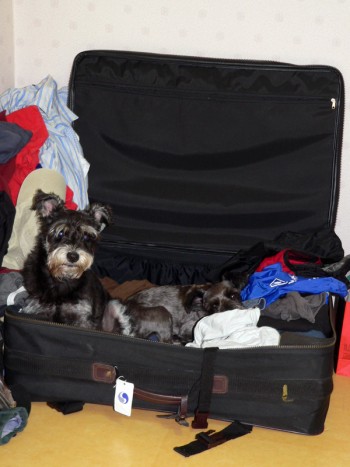Some of the most common reasons foreigners in Korea have for giving up a pet include not having enough time, complaints from landlords or neighbours, and the cost of travelling home. Many of these issues can be solved! Before deciding to give up your pet, please consider some of the following solutions:
Troubleshooting Common Issues
Time Issues
If your work schedule changes and you find you have to work longer hours, considering finding a daytime pet-sitter, dog-walker, or pet day care facility to make life more manageable for your companion.
Landlord Issues
Offer an extra deposit if your landlord is afraid of damage, or find a realtor to help you move to a pet-friendly apartment.
Flight Costs
The typical cost of flying a pet to North America is twice the excess baggage fee, around W300,000. By saving just W25,000 / month for a year, you have the cost of your pet's air ticket. Why not ask your friends and family to give you money instead of gifts for birthdays and special occasions to help you save up?
Travel Issues
You can find a pet sitter or pet hotel if you have to travel without your pet. Consider getting an extension to your visa for a few weeks in order to avoid seasonal embargo periods when airlines refuse to fly pets. If you can't change the date of an already scheduled flight, try posting a request for a pet courier who could transport your pet as accompanied baggage at a later date. Also research pet shipping companies, some of whom offer door-to-door services to almost anywhere on the planet.
Where to Find Help
For behaviour issues:
- Certification Council for Professional Dog Trainers - lists certified trainers in Korea.
- ASPCA Virtual Pet Behaviorist - articles with solutions to cat and dog behaviour problems.
- Pet Education - articles on behaviour, training, and health issues to help you troubleshoot problems in cats, dogs, and smaller pets.
- Dogster and Catster Behavior & Training Forums - have extensive information about behavior issues and solutions, as well as active community forums where you can get advice from experienced guardians.
For travel or work schedule issues:
- Airborne Animals - a Korea-based Facebook group created to help with pet travel questions, finding a courier, etc.
- Pet Sitting Network - South Korea - Another Facebook group which can help you find a pet sitter while you're away.
- ARK Pet Travel Links - The "Pet travel" categories of the links directory have general tips about travel and pet importation.
For landlord and housing issues:
The article "Landlords - Suggestions on How to Deal with Issues" by Katelin MacNair is full of helpful advice.
For Serious, Unforeseeable Issues
When your circumstances are more serious than the common issues mentioned above, or when you can't find a solution that works, please consider these tips:
Advanced Planning
Post an adoption listing as far in advance as you can. It can take weeks or months to find a new home for an animal. Waiting until the last minute often leads to rushed decisions or passing a pet to the first person who shows interest. This in turn often begins a cycle of "pass the pet". Animals who move from home to home to home can become stressed and traumatized and can develop behaviour issues that make finding a permanent home even harder.
Screening
Screen potential adopters, use an adoption application, and request an adoption fee. These steps help ensure the next adopter is a committed, responsible person whose lifestyle matches the needs and personality of your pet.
Animal Shelters
Avoid relinquishing your pet to an animal shelter. Though well-meaning, most animal shelters in Korea are overcrowded and struggle to find funding for basic needs such as food and vet care. Moving an animal from a home into a noisy, crowded shelter is traumatic. Many animals fall ill just from stress. Sick animals in shelters are a greater risk of being "euthanized" (ie. killed).
Shelter "Euthanasia" Policies
If you have no other option but to relinquish your pet to a shelter, make sure they have a no-kill policy and will not only hold your pet for a limited amount of time before killing him/her. Shelters can legally kill a homeless animal after only 10 days, sometimes less when the animal is relinquished by his/her owner (ie. the shelter knows no owner searching for this lost pet). Ask what percentage of animals at the shelter find new homes and what the shelter will do to find one. Make sure your pet is healthy and fully vaccinated before bring her there to reduce the risk of her being euthanized for a sickness that the shelter cannot afford to treat.
Temporary Help
If you find a no-kill shelter, rescue group, or foster parent who agrees to take care of your pet until a permanent home can be found, provide them with all vaccination and health certificates as well as a deposit to cover food and other expenses for the weeks or months it will take to find a new home.
Written by Karen Busch. Originally published in 2011.

